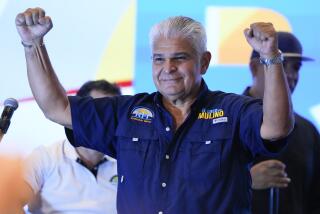There’s Solid Precedent in Seeking OAS Consensus on Isolating Noriega
In 1984, Panama joined the many other Latin American countries that made the transition from military rule to constitutional democracy during the Ronald Reagan years.
But in September, 1985, Gen. Manuel A. Noriega forced his country’s elected president to resign--the first step back from the movement toward democracy in Latin America. As a member of the national security staff in the Reagan White House, I was unsuccessful in efforts to bring this issue before the President. Yet I believed then, as I do today, that the failure to help the people of Panama restore democracy would cause ever graver crises involving larger human and strategic costs in the future.
After this month’s fraudulent elections and the accompanying violence against opposition leaders, President Bush should use the full resources of the United States to help the people of Panama restore democracy. He has a bipartisan consensus about the facts in Panama in support of his initial diplomatic and military steps.
The objective now should be the removal of Noriega and his clique of collaborators with the installation of the newly elected government of the Panamanian democratic opposition. The United States should take the lead to accomplish this through the collective security instruments of the Organization of American States.
The first step would be a quiet process of briefing and persuasion in order to build a consensus among a two-thirds majority of the 32 OAS members. After that consensus has been obtained informally--and with competent diplomacy this can be done quickly--the issues should be presented for formal action by the OAS.
There is an important precedent, which was undertaken by the Jimmy Carter Administration in 1979. At that time, the OAS decided that due to the “conduct of the dictatorial regime governing the country . . . the spirit of hemispheric solidarity . . . places an unavoidable obligation on the American countries to . . . bring about the immediate and definitive replacement of the . . . regime (with the) installation . . . of a democratic government . . .” Those words resulted in the total isolation of the Anastasio Somoza regime in Nicaragua. They should be applied to the Noriega dictatorship today. And, also following the 1979 precedent, OAS diplomatic recognition should be conferred on a Panamanian government that represents the democratic aspirations of the people.
With those steps having been taken and virtually all OAS member states having isolated Noriega diplomatically and economically, efforts should then be made to persuade our allies in the Atlantic Alliance and other key Free World countries to do the same. With some creativity, it is possible to find ways of channeling economic help through the Panamanian liberation government to the people of Panama--especially the poorest--so that it is the Noriega regime that bears the principal weight of this political and economic isolation.
With these first collective security measures in place, there should be a final offer to Noriega and his clique. In the interest of avoiding further disruption and possible violence, Noriega and his faction could resign with the promise that there would be no retribution, prosecution or confiscation of their current property holdings now or at any time in the future.
If that last offer is rejected, then the Bush Administration must be prepared to take all necessary means to help the people of Panama--including the sensible majority of the Panamanian military--accomplish the objectives of the OAS resolution and restore democracy.
Failure to act until democracy is restored will consign the courageous people of Panama to servitude under a Noriega regime that month by month has been moving closer into the Cuban orbit. Already Cuba provides bodyguards, secret police and military personnel who have been training a new, more politically reliable (though still small) military force and have been helping Noriega in his campaign of repression, harassment of U.S. military personnel and with drug smuggling. Unless Bush acts effectively, he risks the chance of Noriega becoming the Moammar Kadafi of the Caribbean--a setback for the cause of democracy in this hemisphere and a growing risk to the Panama Canal.
More to Read
Sign up for Essential California
The most important California stories and recommendations in your inbox every morning.
You may occasionally receive promotional content from the Los Angeles Times.









